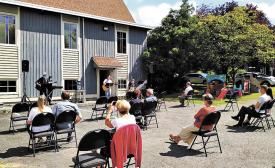Pandemic offers new opportunities for students
The pandemic this year has turned the master of theological study (MTS) program’s teaching model on its head.
The pandemic this year has turned the master of theological study (MTS) program’s teaching model on its head.
Recently the worldwide number of souls lost to the COVID-19 virus surpassed 1 million. Visualizing that large number of lives cut short touches one’s own soul. We, the living, mourn and seek to understand.
Members of Low German-speaking Mennonite communities in southwestern Ontario have experienced public discrimination recently because of a surge in COVID-19 cases in their population. Incidents include negative online comments, cancelled playdates with children in the Low German community, and aggressive verbal attacks at the grocery store.
The past few months have awakened us to our fragility as individuals, communities and nation states. We’ve observed the fragility of our health-care system, food-supply chain, economies, global trade, international relations, institutional accountability. It seems that everything in our world is fragile, including ourselves.
The Mennonite World Conference (MWC) COVID-19 inter-agency task force has approved 21 relief proposals.
Windsor-Essex County in southwestern Ontario has drawn a plethora of attention during the COVID-19 pandemic. Due to ongoing outbreaks and high occurrences of infections in specific sectors, the virus is still taking quite a toll in the region, despite the efforts of many.
Mennonite Educational Institute in Abbotsford, B.C. plans a Stage 1 reopening of school in September for the 2020-21 academic year.
The Province of B.C. defines Stage 1 as a regular school opening with a 100 percent density target for students and five days per week of Kindergarten to Grade 12 in-class instruction.
Twenty Mennonite Church Canada congregations are among the first 40 churches that have received grants from the Mennonite Disaster Service (MDS) Canada Spirit of MDS Fund.
The fund was created by MDS Canada in April to help Canadian churches respond to people in their communities facing hardship due to COVID-19.
Although precise data does not exist, Die Mennonitische Post reports numerous presumed COVID-19-related deaths on several Mennonite colonies in Bolivia. Kennert Giesbrecht, the Post’s editor, who is highly regarded among colony Mennonites in Latin America, is in regular contact with people on many colonies.

Cedric Martin, artistic producer and actor for Theatre of the Beat, records his part in Yellow Bellies the Audio Drama in his closet. (Photo courtesy of Theatre of the Beat)

Johnny Wideman, playwright, actor and co-founder of Theatre of the Beat, records his part in Yellow Bellies the Audio Drama from his home. (Photo courtesy of Theatre of the Beat)

The cast of Yellow Bellies the Audio Drama records altogether through a Zoom call. Pictured from left to right, top row: actor Johnny Wideman, actor Cedric Martin and musician Joe McLellan; and bottom row: actor Kimberlee Walker and director Sukhpreet Sangha. (Photo courtesy of Theatre of the Beat)
Cedric Martin, artistic producer of Theatre of the Beat, knows that live theatre “will be one of the last gatherings to be allowed again” as businesses reopen in the shadow of COVID-19. That reality forced the staff of the Canadian touring company to get creative.

Members of Sherbrooke Mennonite in Vancouver met for an outdoor worship service on July 5. They followed provincial protocols by encouraging masks and discouraging strong singing, and with worship leaders behind plexiglass. The parking lot location allowed sensitive members to stay in cars. (Photo by Garry Janzen)
With most churches remaining closed four months into the pandemic, some in Mennonite Church British Columbia are finding innovative ways to worship together—with limitations.
On July 5, members of Sherbrooke Mennonite Church in Vancouver held an outdoor service in the church parking lot, their first physical gathering since March.
It is now month five for Canadian communities struggling with the COVID-19 crisis. In this time, we’ve heard many pronouncements by health authorities on what members of the public should and should not do to protect themselves against the novel coronavirus. As it spreads, health experts continue to research and learn, experiment and make recommendations.
“There is lockdown and physical distancing, but even so, we can meet in prayer,” said Hanna Soren, a member of the Mennonite World Conference (MWC) Deacons Commission, who offered a prayer at the close of the organization’s first online prayer meeting on May 31. “From different countries, we can come together and pray together in this way.

(Image by seth0s/Pixabay)
Not long ago a group of churches and church leaders across the province signed a letter asking Ontario premier Doug Ford to allow churches to reopen at the beginning of the month of June. I did not sign the letter.
Despite the way some church leaders have tried to frame this issue, the restrictions we’ve been facing are not a matter of religious freedom. People of faith are not being unfairly targeted because of their religious beliefs or practices any more than are those who would like to go to the gym or watch a pro basketball game.
Mennonite Church Canada is donating $50,000 to the Global Sharing Fund operated by Mennonite World (MWC) to help MWC-member churches struggling because of the COVID-19 global pandemic.

The cover of the Sunday, May 24 issue of the New York Times.
I started Sunday morning in tears as I read through the heartbreaking list that blanketed the front page of the New York Times. To mark the deaths of (at that point) nearly 100,000 American citizens, the paper listed the names of a thousand of them.
The executive directors of Mennonite Church Canada and Mennonite Church USA (MC USA) have published a letter of encouragement to constituents this week during the COVID-19 pandemic. The letter—which you can read below—acknowledges the unusual circumstances and challenges surrounding this year’s Holy Week, while offering a message of hope and unity.

Robert and Irene Suderman. (Photo courtesy of Facebook.com/MennoniteChurchCanada)
I am—apparently—vulnerable. This for two reasons: I’m chronologically categorized (senior), and I’m locationally challenged (live in a senior’s community).
But I don’t feel vulnerable. My wife and I are both in excellent health, with robust energy, and significantly active in meaningful things. The social definition and my personal experience of who I am don’t match.
Mennonite Church Canada, in collaboration with its regional churches and their local congregations, will share worship services each week for congregations across our nationwide community of faith.
Thursday, as I sat down to a board meeting for the Micah Mission, a restorative justice organization in Saskatoon, I got the news that the Juno Awards show was being cancelled in an effort to curb the spread of COVID-19. For months I’d been hearing the Junos hyped on CBC Radio 2 and seeing advertisements on billboards around town, where the shows were to be broadcast from.
As of March 11, the World Health Organization is now describing the global outbreak of the coronavirus COVID-19 as a pandemic. This move is not to incite fear but to motivate governments to ramp up their preparation efforts before the virus spreads more quickly in their own countries.